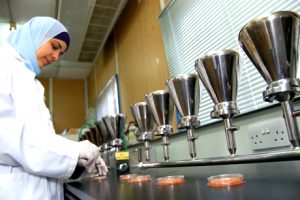This post is part of a series of reviews summarizing discussions that took place at the 2013 Harvard Arab Weekend. For more information about this event, the largest pan-Arab conference in North America, please visit http://harvardarabweekend.org/
Panel Speakers:
- Nafez Dakkak, Manager, Online Education Initiative, Queen Rania Foundation

- Adel bin Mohammad Fakeih, Minister of Labor, Saudi Arabia
- Noureddine Mouaddib , Founder & President, International University of Rabat
On November 9 at the Harvard Arab Weekend, a panel of three diverse experts on education and youth employment in the Arab world presented their reflections on the key challenges and opportunities in this field. All panelists began by emphasizing the pressing importance of this issue, noting that the Middle East has the highest level of youth unemployment in the world, and that nearly 65% of the region’s population is comprised of young people. They also addressed issues of both labor supply and labor demand, and the importance of mitigating the pervasive job-training mismatch problem.
The Saudi Arabian Minister of Labor, His Excellency Adel bin Mohammed Fakeih, emphasized a unique employment challenge that faces Saudi Arabia, given that many companies operating in the country scan the world for the best talent that can be obtained for the lowest cost. Thus, unlike in other situations, young Saudis must compete with a truly global applicant pool for jobs within their own country. In 2011, only 10% of the private sector workforce in the country was comprised of Saudi nationals. However, due to recent government policies that reward companies for recruiting more Saudis (specifically, easing their ability to renew work permits for non-Saudi nationals the more Saudis they employ), Saudis now comprise 20% of the private sector workforce.
With regards to the labor supply, the Saudi Ministry of Labor has been working to establish “double diploma” programs as part of its Colleges of Excellence competition, in which students obtain degrees from a Saudi institution as well as a partnering university or other education institution abroad.
Dr. Noureddine Mouaddib of Morocco also spoke to the job-training mismatch problem, and specifically the labor demand challenge that Morocco faces in that 60% of all university graduates have social science or humanities backgrounds and the market cannot absorb all this, while numerous high-demand IT and engineering positions go unfilled. In response to these challenges, Dr. Mouaddib’s university, which was established in 2005, has developed initiatives to analyze Morocco’s sector-specific labor needs, generate 10,000 engineering graduates, and develop training programs in partnership with companies to ensure that graduates’ skills match the employers’ needs and demands.
Dr. Mouaddib then spoke about the uniqueness of his own university, which was the first university of its kind — a state institution with private management. He encouraged similar public-private partnership efforts in the education sector to help tackle the daunting employment challenges for the region.
Nafez Dakkah of the Queen Rania Foundation then noted that having some degree of mismatch between skills and employment opportunities is a natural phenomenon in all economies, but the rapid rate at which the skill needs of employers have been changing in the region is what presents the real challenge. He states that every five years the skills demanded in the tech sector radically change, for example, so that if you attend a 4-year university your skills might become outdated only one year after your graduation. As one solution, Dakkah pointed to online education initiatives, or MOOCs (massive open online courses), which allow people to renew their skills at relatively low cost. He also noted that part of the problem in some Arab countries, including Jordan, is a lack of investment in early childhood education. Research highlights the critical role of early childhood education in soft skill development and future professional success, so the Queen Rania Foundation and others are devoting resources to address this underinvestment.
During the question and answer session, Minister Fakeih discussed Saudi female unemployment and the need to create more opportunities for those women actively seeking work. He also mentioned that the Ministry is providing incentives for companies that hire the disabled. The panelists then considered the presence of offshore American or Western universities in the MENA region, concluding that while these branches may lend some legitimacy and prestige to local graduates, they may not help increase the quality of local educational institutions. Thus, the “double diploma” model of active partnerships between local and international universities seemed preferred.
Dakkah touched upon the value of collaborating with community building organizations to help provide free internet access, allowing MOOCs to reach a broader population. Finally, Dr. Mouaddib concluded with what he sees as three conditions for the success of his and any other new higher education model in the region: receiving state support and sponsorship (to ensure the initiative is sustainable in the long term), partnering with overseas institutions to learn best practices (through double diplomas or otherwise), and, finally, mobilizing academics in the global diaspora community of Morocco or any Arab country to help build more effective, high-quality, and highly responsive Arab educational institutions that can equip students with skills that meet the demands of the rapidly evolving global economy.
